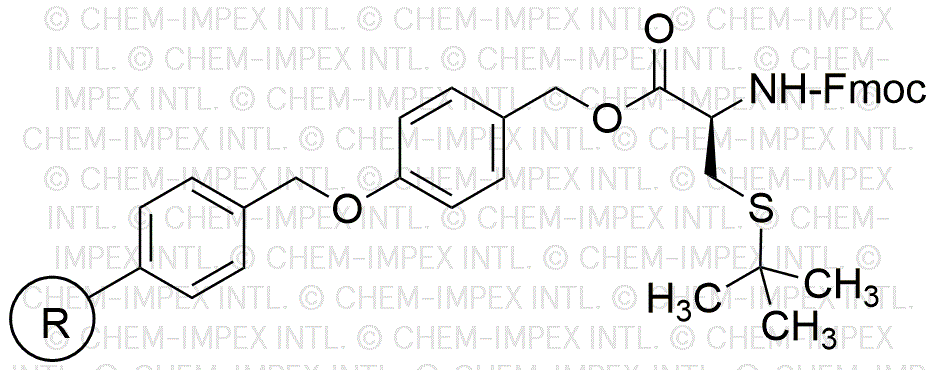Fmoc-S-tert-butyl-L-cysteine 4-alkoxybenzyl alcohol resin is widely utilized in research focused on:
- Peptide Synthesis: This resin is essential in solid-phase peptide synthesis, allowing for the efficient assembly of peptides with high purity and yield.
- Drug Development: It serves as a key intermediate in the development of peptide-based therapeutics, particularly in creating novel drugs targeting specific diseases.
- Bioconjugation: The resin facilitates the attachment of peptides to various biomolecules, enhancing the efficacy of drug delivery systems and improving targeting capabilities.
- Protein Engineering: Researchers use this compound to modify proteins, enabling the study of protein interactions and functions, which is crucial in understanding biological processes.
- Material Science: It is applied in the development of smart materials, where peptide sequences can be integrated into polymers for advanced applications in biomedical devices.
Información general
Propiedades
Seguridad y normativas
Aplicaciones
Fmoc-S-tert-butyl-L-cysteine 4-alkoxybenzyl alcohol resin is widely utilized in research focused on:
- Peptide Synthesis: This resin is essential in solid-phase peptide synthesis, allowing for the efficient assembly of peptides with high purity and yield.
- Drug Development: It serves as a key intermediate in the development of peptide-based therapeutics, particularly in creating novel drugs targeting specific diseases.
- Bioconjugation: The resin facilitates the attachment of peptides to various biomolecules, enhancing the efficacy of drug delivery systems and improving targeting capabilities.
- Protein Engineering: Researchers use this compound to modify proteins, enabling the study of protein interactions and functions, which is crucial in understanding biological processes.
- Material Science: It is applied in the development of smart materials, where peptide sequences can be integrated into polymers for advanced applications in biomedical devices.
Documentos
Hojas de datos de seguridad (HDS)
La SDS proporciona información de seguridad completa sobre la manipulación, el almacenamiento y la eliminación del producto.
Especificación del producto (PS)
La PS proporciona un desglose completo de las propiedades del producto, incluida la composición química, el estado físico, la pureza y los requisitos de almacenamiento. También detalla los rangos de calidad aceptables y las aplicaciones previstas del producto.
Certificados de análisis (COA)
Busque certificados de análisis (COA) ingresando el número de lote del producto. Los números de lote y de partida se pueden encontrar en la etiqueta de un producto después de las palabras "Lote" o "Lote".
Número de catálogo
Número de lote/lote
Certificados de origen (COO)
Este certificado de origen confirma el país en el que se fabricó el producto y también detalla los materiales y componentes utilizados en él y si se deriva de fuentes naturales, sintéticas u otras fuentes específicas. Este certificado puede ser necesario para cumplir con las normativas aduaneras, comerciales y regulatorias.
Número de catálogo
Número de lote/lote
Hojas de datos de seguridad (HDS)
La SDS proporciona información de seguridad completa sobre la manipulación, el almacenamiento y la eliminación del producto.
DownloadEspecificación del producto (PS)
La PS proporciona un desglose completo de las propiedades del producto, incluida la composición química, el estado físico, la pureza y los requisitos de almacenamiento. También detalla los rangos de calidad aceptables y las aplicaciones previstas del producto.
DownloadCertificados de análisis (COA)
Busque certificados de análisis (COA) ingresando el número de lote del producto. Los números de lote y de partida se pueden encontrar en la etiqueta de un producto después de las palabras "Lote" o "Lote".
Número de catálogo
Número de lote/lote
Certificados de origen (COO)
Este certificado de origen confirma el país en el que se fabricó el producto y también detalla los materiales y componentes utilizados en él y si se deriva de fuentes naturales, sintéticas u otras fuentes específicas. Este certificado puede ser necesario para cumplir con las normativas aduaneras, comerciales y regulatorias.

